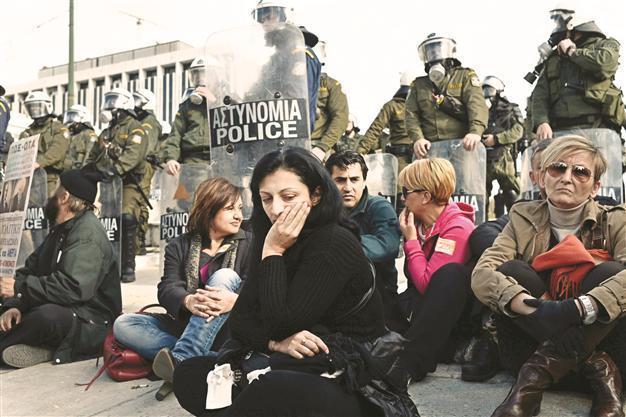S&P raises Greece’s rating by 6 notches
PARIS / ATHENS

Municipality workers sit in front of anti-riot police during a demonstration outside the Parliament in Athens. S&P raised Greece’s rating to B-/B. AFP photo
Ratings agency Standard and Poor’s raised Greece’s sovereign debt rating by six notches Dec. 18, encouraged by a burst of support for Athens from eurozone partners.
The upgrade from selective default to B-/B “reflects our view of the strong determination of European Economic and Monetary Union (eurozone) member states to preserve Greek membership in the eurozone,” an S&P statement said.
The outlook for Greek public debt was stable because of the government’s commitment to fiscal and structural adjustments, it added.
‘Climate of optimism’Greek Finance Minister Yannis Stournaras said the decision “was a very important one that created a climate of optimism.” “But we know that the road is still long and hard, the hour is not one for easing up,” he said.
The upgrade came after Greece completed a debt buyback program and eurozone finance ministers approved fresh loans under a second bailout.
S&P had placed Greece in selective default earlier this month, pending the result of the buyback.
“We view the eurozone member states’ decision to provide material cash flow relief to Greece as indicative of their determination to restore stability to Greek finances, and to preserve Greece’s eurozone membership,” S&P said. The European Union and the International Monetary Fund have provided most of the emergency relief for Greece, via two rescue packages.
Public sector walks off the jobMeanwhile, public sector workers walked off the job yeterday in protest at new austerity measures and planned layoffs, disrupting local transport, grounding flights and shutting schools and tax offices.
The 24-hour strike is the latest in a series of protests since September against a package of wage cuts and tax hikes demanded by Greece’s international lenders as the price for bailout loans to keep the country afloat.
The walkout was called by the ADEDY union which represents about half a million public sector workers or about a quarter of the country’s workforce.
Thousands of teachers, doctors and municipal workers took to the streets and rally in central Athens around midday.
The measures, which include earmarking 27,000 civil servants for eventual dismissal, remain deeply unpopular among Greeks who say society is crumbling under the weight of spending cuts and tax hikes that hurt mostly the middle incomes.
